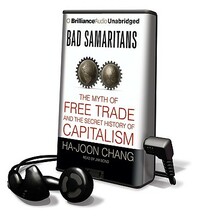Take a photo of a barcode or cover
69 reviews for:
Bad Samaritans: The Myth of Free Trade and the Secret History of Capitalism
Ha-Joon Chang
69 reviews for:
Bad Samaritans: The Myth of Free Trade and the Secret History of Capitalism
Ha-Joon Chang
Clear, thorough explanation of modern economics, obligatory reading for everyone interested in the topic (and probably everybody not interested too).
informative
fast-paced
Loved this book's clear and repeated truth-telling to power (to the power of the usually-failed neo-liberals).
My only complaint is that a more systematic handling of examples: in place of "these countries experienced X, so there", instead "these 46 countries experienced X, 3 to 7 not X" would have been better. There was some of that.
Good book.
My only complaint is that a more systematic handling of examples: in place of "these countries experienced X, so there", instead "these 46 countries experienced X, 3 to 7 not X" would have been better. There was some of that.
Good book.
Ugh. This is long because this book represents so much I hate about this kind of book, but bottom line it’s just more confirmation bias exploiting bullshit. I’ve filed under NWR, but it probably is worth reading just to see how this kind of project works.
This is a perfect example of the kind of popular science book that I detest, and it’s probably unfair to single this one out as it’s almost ubiquitous these days. I’m using the word “science” here very broadly, thinking of any technical topic from “social science” to physics. The author uses 250-odd pages to tell me how bad an economic theory is that he just made up. He’s invented his own personal idea of “free trade economics” or “neo-liberalism” and spends all this time showing how wrong it is. He’s Korean for god’s sake, surely he’s aware that pretty much no one in the world thinks S Korea grew so successfully because of anything other than clever industrial policy, not some grade-school notion of “free trade”?
The structure is straightforward. Write down a silly version of an idea, in this case “neo-liberalism”. Then fill a book reciting anecdotes as evidence that contradict this idea you’ve written down. No need to take all or most information into account, it’s entirely sufficient to cherry-pick stylised facts to demolish your strawman. These books like to go further than that, and try to fabricate moral outrage as well. It’s important to give your strawman theory the heft of a principle or moral conviction that some actors - people, institutions or countries - are pegged with holding dear. This rhetorical gambit then allows you to add some anecdotes about how those actors did things that were inconsistent with the principle, or pursued policies along the lines of your strawman theory but for different, purely self-interested material reasons. Clearly these people or countries are hypocritical and therefore morally corrupt. Case closed, hang-em high!
To get to some specifics. In my copy of this book, Chapter 1, page 12 he has:
“For most economists, the answer is a very simple one. Korea has succeeded because it has followed the dictates of the free market”.
Chapter 1, page 14 he adds:
“This neo-liberal establishment would have us believe that, during its miracle years between the 1960s and the 1980s, Korea pursued a neo-liberal economic development strategy.”
I suppose it is likely that someone somewhere has made these claims, but I don’t think I’ve ever seen them, and I’ve spent most of my life working in these markets. I’m no economist, but everything I’ve ever read about Korea (and what used to be called the “Asian Tigers” more broadly) speaks at length about the success of these countries’ industrial policy, saying more or less exactly what he subsequently says is the correct explanation, as though he’s just discovered this idea despite the best efforts of an oppressive neo-liberal establishment cabal. I believe (to be proven with an actual literature review by someone more capable than me) that there is a vast literature in international and developmental economics about how careful targeted State direction led to the remarkable growth of several countries in Asia at this time. If that is the case, I would say that these statements he’s made are simply fraudulent.
Which is fine, as I’m sure he’s employing this kind of rhetorical device in a good cause. But honestly, is this a foundation on which to build your book? The bias is clear from the outset: he introduces the “Unholy Trinity” (his label, introduced with no rationale, simple name-calling) of the IMF, WTO and World Bank on p13. He immediately then stirs in the malign actions of “rich governments” which he says “are carrots to induce the developing countries to adopt neo-liberal policies”. No they’re not! They’re typically self-interested policies pursued to satisfy the demand of powerful domestic interests, usually farmers, who want tariffs on agricultural imports, or tech who want to enforce intellectual property rights. By page 16 we’re onto “Bad Samaritans”, defined as rich countries who take “advantage of others who are in trouble”. I like this bit of rhetoric, as it creates a kind of normative presumption of Good Samaritan-ship in international relations, without actually having to make that idiotic case. It also gives the argument of the book it’s moral weight, and probably goes wholly unconsidered by many readers, who are increasingly outraged by the self-interested, hypocritical actions of rich nations. If you start with the premise that nations are merely the expression of a collection of entirely venal, self-interested and short-term thinking influencers, then the idea that any arrangement is pointed towards fostering the long-term development of less wealthy people is just laughable. Clearly it’s not as simple as that, and there are politicians, policy-makers and other voices who push for international cooperation and assistance, but I think these are rare and weak exceptions to the basic instinct of our species, which is to form groups and for each to work to promote the interests of that group.
I continue to be surprised by the apparent surprise of others that wealthy or powerful people (usually one and the same) go to great lengths to preserve and increase their wealth/power. Of course intellectual property rules exist to preserve value for the inventors, and at the same time limit access to that asset, so in a sense represents a harm to those who didn’t do the inventing. Of course the lenders of last resort have requirements associated with lending, including limits on deficits and so on. And of course they’re worried about theft and corruption. Who are these “Samaritans” he’s talking about? Why would the Haves ever want to help the Have Nots? When have they ever done so, in any meaningful way?
I guess there’s a literature of freemarketeers that he’s writing in opposition to, and I’m just not familiar with it. Maybe if I read position papers from the IMF or World Bank, I’d be similarly irritated and feel that this kind of work is necessary. It’s likely those institutions manage to combine a superficial, self-serving form of economic thinking with some kind of noble mission statement, something about alleviating poverty and encouraging growth, which would anger any compassionate clear-thinking economist. The kind of rank hypocrisy that these institutions exhibit, however, could probably be parcelled up with many other places, surely. Much as I try, I can only see this as grist for the infotainment mill.
Where does this kind of writing cross the line from the exposition of an idea or a review of some field of study into outright propaganda? This is so one-side that it feels like it must be propaganda, but also so deeply unpersuasive to me that it doesn’t really operate like good propaganda ought. Maybe not just bad propaganda, but more like entertainment or “info-tainment”? I suppose it could be considered entertainment for people who are already bought into and interested in the core idea that “neo-liberalism is bad”. Maybe for people who aren’t familiar with much economics or history, it adds a grab-bag of historical anecdotes and details of contemporary economic arrangements that will shore up a heretofore vague distrust of the Establishment. That’s less a convincing or propaganda function, more an on-going brainwashing.
This is a perfect example of the kind of popular science book that I detest, and it’s probably unfair to single this one out as it’s almost ubiquitous these days. I’m using the word “science” here very broadly, thinking of any technical topic from “social science” to physics. The author uses 250-odd pages to tell me how bad an economic theory is that he just made up. He’s invented his own personal idea of “free trade economics” or “neo-liberalism” and spends all this time showing how wrong it is. He’s Korean for god’s sake, surely he’s aware that pretty much no one in the world thinks S Korea grew so successfully because of anything other than clever industrial policy, not some grade-school notion of “free trade”?
The structure is straightforward. Write down a silly version of an idea, in this case “neo-liberalism”. Then fill a book reciting anecdotes as evidence that contradict this idea you’ve written down. No need to take all or most information into account, it’s entirely sufficient to cherry-pick stylised facts to demolish your strawman. These books like to go further than that, and try to fabricate moral outrage as well. It’s important to give your strawman theory the heft of a principle or moral conviction that some actors - people, institutions or countries - are pegged with holding dear. This rhetorical gambit then allows you to add some anecdotes about how those actors did things that were inconsistent with the principle, or pursued policies along the lines of your strawman theory but for different, purely self-interested material reasons. Clearly these people or countries are hypocritical and therefore morally corrupt. Case closed, hang-em high!
To get to some specifics. In my copy of this book, Chapter 1, page 12 he has:
“For most economists, the answer is a very simple one. Korea has succeeded because it has followed the dictates of the free market”.
Chapter 1, page 14 he adds:
“This neo-liberal establishment would have us believe that, during its miracle years between the 1960s and the 1980s, Korea pursued a neo-liberal economic development strategy.”
I suppose it is likely that someone somewhere has made these claims, but I don’t think I’ve ever seen them, and I’ve spent most of my life working in these markets. I’m no economist, but everything I’ve ever read about Korea (and what used to be called the “Asian Tigers” more broadly) speaks at length about the success of these countries’ industrial policy, saying more or less exactly what he subsequently says is the correct explanation, as though he’s just discovered this idea despite the best efforts of an oppressive neo-liberal establishment cabal. I believe (to be proven with an actual literature review by someone more capable than me) that there is a vast literature in international and developmental economics about how careful targeted State direction led to the remarkable growth of several countries in Asia at this time. If that is the case, I would say that these statements he’s made are simply fraudulent.
Which is fine, as I’m sure he’s employing this kind of rhetorical device in a good cause. But honestly, is this a foundation on which to build your book? The bias is clear from the outset: he introduces the “Unholy Trinity” (his label, introduced with no rationale, simple name-calling) of the IMF, WTO and World Bank on p13. He immediately then stirs in the malign actions of “rich governments” which he says “are carrots to induce the developing countries to adopt neo-liberal policies”. No they’re not! They’re typically self-interested policies pursued to satisfy the demand of powerful domestic interests, usually farmers, who want tariffs on agricultural imports, or tech who want to enforce intellectual property rights. By page 16 we’re onto “Bad Samaritans”, defined as rich countries who take “advantage of others who are in trouble”. I like this bit of rhetoric, as it creates a kind of normative presumption of Good Samaritan-ship in international relations, without actually having to make that idiotic case. It also gives the argument of the book it’s moral weight, and probably goes wholly unconsidered by many readers, who are increasingly outraged by the self-interested, hypocritical actions of rich nations. If you start with the premise that nations are merely the expression of a collection of entirely venal, self-interested and short-term thinking influencers, then the idea that any arrangement is pointed towards fostering the long-term development of less wealthy people is just laughable. Clearly it’s not as simple as that, and there are politicians, policy-makers and other voices who push for international cooperation and assistance, but I think these are rare and weak exceptions to the basic instinct of our species, which is to form groups and for each to work to promote the interests of that group.
I continue to be surprised by the apparent surprise of others that wealthy or powerful people (usually one and the same) go to great lengths to preserve and increase their wealth/power. Of course intellectual property rules exist to preserve value for the inventors, and at the same time limit access to that asset, so in a sense represents a harm to those who didn’t do the inventing. Of course the lenders of last resort have requirements associated with lending, including limits on deficits and so on. And of course they’re worried about theft and corruption. Who are these “Samaritans” he’s talking about? Why would the Haves ever want to help the Have Nots? When have they ever done so, in any meaningful way?
I guess there’s a literature of freemarketeers that he’s writing in opposition to, and I’m just not familiar with it. Maybe if I read position papers from the IMF or World Bank, I’d be similarly irritated and feel that this kind of work is necessary. It’s likely those institutions manage to combine a superficial, self-serving form of economic thinking with some kind of noble mission statement, something about alleviating poverty and encouraging growth, which would anger any compassionate clear-thinking economist. The kind of rank hypocrisy that these institutions exhibit, however, could probably be parcelled up with many other places, surely. Much as I try, I can only see this as grist for the infotainment mill.
Where does this kind of writing cross the line from the exposition of an idea or a review of some field of study into outright propaganda? This is so one-side that it feels like it must be propaganda, but also so deeply unpersuasive to me that it doesn’t really operate like good propaganda ought. Maybe not just bad propaganda, but more like entertainment or “info-tainment”? I suppose it could be considered entertainment for people who are already bought into and interested in the core idea that “neo-liberalism is bad”. Maybe for people who aren’t familiar with much economics or history, it adds a grab-bag of historical anecdotes and details of contemporary economic arrangements that will shore up a heretofore vague distrust of the Establishment. That’s less a convincing or propaganda function, more an on-going brainwashing.
adventurous
funny
informative
reflective
fast-paced
It's all been told in the other books from the author and in the interviews he gave over the years.
This is a modern take on some of the capitalistic ideals that our economy is based on and brings up some common points on Free trade. While Mr Chang's concepts are sound I can't help feel that his writing is a bit on the dry side and would recommend Naomi Kliens work do David Korten's 'When Corporations Rule the World' for deeper reading on the subject.
The Bad Samaritans of the title are the rich countries and their instruments, the IMF and the World Bank who "help" developing countries with policies that ensure they remain in their place of low-wage, low-technology producers of cheap industrial and agricultural goods.
It does an excellent job of exploding the myths of neo-liberal economics and making alternative suggestions on how we can build a more equitable global economy.
It does an excellent job of exploding the myths of neo-liberal economics and making alternative suggestions on how we can build a more equitable global economy.
I totally snoozed through my high school economics class, easily the most boring class I studied then (taught by the football coach who also had no interest in the topic). However, Chang Ha-joon made it really easy to understand without watering down the concepts. It’s fascinating and he writes with thoughtfulness. Whatever you think of capitalism and the free market, it’s important to be aware of the implications, and this book not only informed about that, but it backed it up and offered reasonable solutions. Really interesting book!




